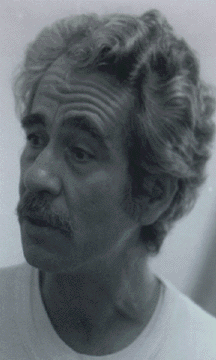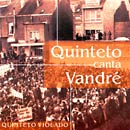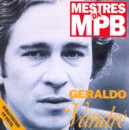terça-feira, 14 de junho de 2011
Geraldo Vandré
Geraldo Vandré

Foto: Mário Luiz Thompson
| Geraldo Pedrosa de Araújo Dias nasceu em Pessoa PB em 12 de Setembro de 1935. Apresentou-se num programa de calouros na Rádio Tabajara de João Pessoa quando tinha 14 anos. Em Nazaré da Mata, onde cursava o ginásio em internato, participou de alguns showsorganizados para as missões. Foi para o Rio de Janeiro RJ em 1951, e nesse mesmo ano se apresentou no programa de calouros de César de Alencar, no qual foi desclassificado. Aproximou-se então de Ed Lincoln, que nessa época tocava com Luís Eça, na boate do Hotel Plaza, tentando cantar nos intervalos das apresentações. Em 1955, com o pseudônimo de Carlos Dias, defendeu a canção Menina (Carlos Lyra) num concurso musical promovido pela TV-Rio. Mais tarde, o encontro com o folclorista Valdemar Henrique abriu-lhe a oportunidade de se apresentar no programa da Rádio Roquete Pinto, usando o nome Vandré, que resultou da abreviatura do nome do pai, José Vandregisilo. Cursou a Faculdade de Direito, do Rio de Janeiro, época em que participou do Centro Popular de Cultura, da extinta União Nacional dos Estudantes, onde conheceu seu primeiro parceiro, Carlos Lyra. Passou então a interessar-se mais pela composição, abandonando a idéia de tornar-se cantor. Fez a letra da música de Carlos Lyra Quem quiser encontrar o amor, gravada por ele em abril de 1961 em 78 rpm, na RGE, e em 1962 por Carlos Lyra no LP O sambalanço de Carlos Lyra, pela Philips. Esta música seria incluída no episódio "Couro de gato" do filme Cinco vezes favela, trabalho produzido pelo Centro Popular de Cultura. Em 1962 apresentou-se no Juão Sebastião Bar, em São Paulo SP, iniciando trabalhos com Luís Roberto, Baden Powell e Vera Brasil. Nesse mesmo ano gravou com Ana Lúcia o Samba em prelúdio (Baden Powell e Vinícius de Moraes), pela Áudio Fidelity, com grande sucesso, e compôs com Carlos Lyra o samba Aruanda. Em dezembro de 1964, gravou na Áudio Fidelity seu primeiro LP, apresentando a toada Fica mal com Deus, além deMenino das laranjas (Téo de Barros). Em 1965 defendeu Sonho de um Carnaval (Chico Buarque) no I FMPB, da TV Excelsior de São Paulo. No mesmo festival, inscrevera sua composição Hora de lutar, que não se classificou. Essa música foi gravada, no mesmo ano, num LP homônimo. Nesse período, musicou o filme de Roberto Santos A hora e a vez de Augusto Matraga. No ano seguinte lançou pela Som Maior o LP Cinco anos de canção, que incluía Pequeno concerto que virou canção, Canção nordestina e Rosa flor (com Baden Powell). Venceu em São Paulo o FNMP, da TV Excelsior, com a música Porta-estandarte (com Fernando Lona), defendida por Tuca e Airto Moreira, assinando depois contrato com a Rhodia para excursionar pelo Nordeste com o Trio Novo, formado por Téo (violão), Airto Moreira (viola caipira) e Heraldo (percussão). Nesse mesmo ano de 1966 venceu ainda o II FMPB, da TV Record, de São Paulo, com Disparada (com Téo de Barros), na interpretação de Jair Rodrigues, do Trio Novo e do Trio Maraia, empatando com A banda (Chico Buarque). Obteve ainda o segundo lugar no I FIC, da TV-Rio, do Rio de Janeiro, com O cavaleiro, parceria com Tuca, que também foi interprete. Em 1967 a TV Record, de São Paulo, concedeu-lhe um programa próprio, Disparada, com direção de Roberto Santos. Inscreveu Ventania (com Hilton Accioly) no III FMPB, que foi desclassificada, e De serra, de terra e de mar (com Téo de Barros e Hermeto Pascoal), no II FIC, da TV Globo, do Rio de Janeiro, que também não obteve classificação. Nesse ano conseguiu sucesso com Arueira e com o frevo João e Maria (com Hilton Accioly). No mesmo período compôs, a convite dos padres dominicanos de São Paulo, a Paixão segundo Cristino, alegoria da crucificação de Cristo num contexto nordestino; participou do programa Canto Geral, depois Canto Permitido, da TV Bandeirantes, de São Paulo. Em 1968 gravou o LP Canto geral pela Odeon, com Maria Rita, O plantador (com Hilton Accioly) e músicas suas desclassificadas em festivais. Participou ainda do IV FMPB, com Bonita (com Hilton Accioly). A música foi apresentada duas vezes, pois se desentendera com o parceiro, rompendo com o Trio Maraia. Nas eliminatórias para o III FIC, em São Paulo, causou impacto com a apresentação de Pra não dizer que não falei de flores,ou Caminhando; defendeu-a no festival com o Quarteto Livre, integrado por Naná (tumbadora), Franklin (flauta), Nelson Ângelo (violão) e Geraldo Azevedo (violão e viola), tendo-se classificado em segundo lugar. A música teve grande êxito, tornando-se uma espécie de hino estudantil, mas teve seu curso interrompido pela censura. Esteve no exílio, inicialmente no Chile (1968), onde compôs a música Desacordonar, com que venceu um concurso, enquanto Caminhando se tornava sucesso. Obrigado a deixar o pais, pois se apresentara em televisão como profissional sem a devida licença, seguiu para a Argélia, onde assistiu ao Festival Pan-Africano, viajando depois para a então Republica Federal da Alemanha, ocasião em que gravou alguns programas para a televisão da Baviera. Esteve na Grécia, Áustria, Bulgária, cantando em povoados do interior. Na Itália, Sérgio Endrigo regravou músicas suas. Em Paris, França, remontou com um grupo de artistas brasileiros a Paixão segundo Cristino, na igreja de Saint-Germain des Pres, na Páscoa de 1970. Trabalhou com um novo tipo de composição, montada apenas com assobios e sons de violão, com forte ritmo nordestino. Gravou o LP Das terras de Benvirá, lançado no Brasil pela Philips em 1973, com Na terra como no céu, Canção primeira e De América. Ainda em 1973 gravou apresentações para o programa de Flávio Cavalcanti e para o Fantástico, da TV Globo, mas foram censuradas. Em 1982, em Presidente Stroessner, Paraguai, apresentou-se em um show, rompendo silêncio de 14 anos. Em março de 1995 apresentou-se no Memorial da América Latina, em São Paulo, no concerto realizado pelo IV Comando Regional (CONAR), em comemoração a Semana da Asa. Na ocasião, um coral de cadetes lançou sua música Fabiana,uma homenagem a FAB. Em 1997 o Quinteto Violado lançou o CD Quinteto Violado canta Vandré (selo Atração), incluindo antigos sucessos e apenas uma música inédita: Republica brasileira. Ainda em 1997, Elba Ramalho, Geraldo Azevedo e Zé Ramalho regravaram Disparada e Canção da despedida no CD Grande encontro 2. Biografia: Enciclopédia da Música Brasileira |
Escute uma amostra do trabalho:
Arueira
(Geraldo Vandré)
Com Geraldo Vandré
Atenção: para ouvir a amostra você precisa do RealPlayer (gratuito) instalado em seu computador. Pegue-o na seção de informática do Terra, clicando aqui.
CDs Recomendados pelo MPBNet:
Quinteto Canta Vandré
Pérolas: Geraldo Vandré
20 Preferidas
Mestres da MPB
segunda-feira, 13 de junho de 2011
domingo, 8 de maio de 2011
sábado, 30 de abril de 2011
terça-feira, 5 de abril de 2011
sábado, 2 de abril de 2011
sexta-feira, 1 de abril de 2011
quinta-feira, 31 de março de 2011
domingo, 23 de janeiro de 2011
"THE INTERNATIONAL SOCIETY FOR KRISHNA CONSCIOUSNESS IS A MOVEMENT AIMING AT THE SPIRITUAL REORIENTATION OF MANKIND THROUGH THE SIMPLE PROCESS OF CHANTING THE HOLY NAMES OF GOD." - HIS DIVINE GRACE A.C. BHAKTIVEDANTA SWAMI PRABHUPADA
THURSDAY, APRIL 14, 2005
To Love God
(Reprinted from a journal of Tajpur, dated Friday, 25th August, 1871)
Written By Thakur Bhaktivinoda
It was Jesus Christ who first said “Love God with all thy heart, with all thy mind, with all thy soul, and with all thy strength, and love man as thy brother.” This is an absolute truth indeed; but different men put different interpretations to this noble expression. The expressions of all great men are nice but somewhat mysterious- when understood they bring the truth nearest to the heart otherwise they remain mere letters that “kill.” The reason of the mystery is that men, advanced in their inward approach to the Deity, are in the habit of receiving revelations which are but mysteries to those that are behind them.
The stages of progress are very much the same as the circles of spiritualism which, though not true themselves, explain a great deal about the gradual development of the soul. We have understood some spiritualists to maintain that matter when sublimated converts itself to spirit. This theory is indeed against any inward conviction. Matter is matter, and Spirit is Spirit; one of them cannot form the other. Spirit is certainly of a superior existence; though we cannot fully understand in our present state of material imprisonment, what relation Spirit does exactly bear to matter space and time.
Metaphysics apart, we decide that the human soul rises higher and higher and can understand things of which we have no idea at present. Subject to this important rule, Jesus Christ of Nazareth received and uttered the words quoted above. To readers who are a little above the scale of ordinary men, these expressions of Jesus teach that men should [-----missing part------] the affections of the heart perceivable in all children as apposed to hate, with all his mind, (meaning the intellect which knows as opposed to ignorance of good things) with all his soul, (meaning that principle of that human constitution which worships the almighty and feels its own immortality) and with all his strength (meaning all active work).
To the inspired, however, more things and better sublimer meanings appear beneath theses holy words of the Inspired Jesus. He teaches man to love God and not to know, infer, hate, or think of God. He tells us that man in his absolute state is not the intellect of the body but is the pure Soul itself. The essence of the soul is wisdom and its action is love absolute. The absolute condition of man is his absolute relation to the Deity in pure love. Love then alone is the religion of the Soul and consequently of the whole man. The pupil asks here “What have I to do with the heart?- my heart loves to see the ‘sun to smile’, to eat the sweetest dish and to see a dance’. Jesus profoundly replies “yes, you must love God with all thy heart, your heart now runs to other things than God, but you must, as you train a bad horse, make your feelings run to the loving God.” This is one of the four principles of worship or what they call in Vaishnava Literature, Shanta Rasa,
Then the pupil says “my Lord, the intellect takes me elsewhere from God, i.e., it wants to take me to Positivism; please instruct me what am I to do?” “ Yes”. Replies Jesus “you must love God with all your mind [--missing word--] and reason, you must not allow yourself to be a dry thinker but must love. Love alone can soften the dryness of the intellect; you must develop the intellect on all good and holy things by means of love of truth spiritual beauty and harmony.” This is the second phase of Vaishnava development which passes by the name of Dashya Rasa. The pupil then inquires whether the development of the affections and the intellect is quite enough for him. Then says the Lord “you must love God with thy soul also, i.e., you must perceive yourself in spiritual communication with the Deity and receive holy revelations in your sublimist hours of worship.” This is called the Sakhya Rasa of the Vaishnavas, - the Soul approaching the Deity in holy and fearless service. The disciple apprehends that he will be lost in such a position and will be unable to act. Then the Savior tells him these words “you must love God with all thy strength or will, - you are wrong in concluding that you will loose you active existence – you will get it the more. Work for God and work to God, proceeding from no interested views but from a holy free will (which is alone the strength of man) and identifying itself with pure love, will fully engross your attention.” This description is of Bhakti in general. Then Jesus proceeds to tell us “You must love man as thy brother.” From this is inferred to fourth phase of love which is a feeling that all men are brothers and God is their common Father. This is Baishalya Rasa in its first stage of development.
Bhakti (love) is thus perceived in the very first development of the man in the shape of heart, then in the shape of mind, then in the shape of soul and lastly in the shape of will. These shapes do not destroy each other but beautifully harmonize themselves into a pure construction of what we call the spiritual man or the Ekanta of Vaishnava Literature.
But there is another sublimer truth behind this fact which is revealed to a few that are prepared for it. We mean that spiritual conversion of the Soul into a woman. It is in that sublime and lofty state in which the soul can taste the sweets of an indissoluble marriage with God of love. The fifth or the highest stage of Vaishnava development is this, which we call Madura Rasa, and on this alone the most beautiful portions of the Vaishnava Literature so ably expatiates. This phase of human life, mysterious as it is, is not attainable by all, nay, we should say, by any but “Gods own”. It is so very beyond the reach of common men that the rationalists and even the ordinary theists cannot understand it, nay, they go so far as to sneer a tit as something unnatural. Oh God I reveal Thy most valuable truths to all so that Your own may not be numbered with the fanatics and the crazed and that the whole of mankind may be admitted as “Your own.”
POSTED BY ADMINISTRATOR AT 8:43 AM 6 COMMENTS
LINKS
Krishnablog.com
Krishna.org
Bhagavad-gita As It Is
PREVIOUS POSTS
To Love God
ARCHIVES
April 2005
ODA
"THE INTERNATIONAL SOCIETY FOR KRISHNA CONSCIOUSNESS IS A MOVEMENT AIMING AT THE SPIRITUAL REORIENTATION OF MANKIND THROUGH THE SIMPLE PROCESS OF CHANTING THE HOLY NAMES OF GOD." - HIS DIVINE GRACE A.C. BHAKTIVEDANTA SWAMI PRABHUPADA
THURSDAY, APRIL 14, 2005
To Love God
(Reprinted from a journal of Tajpur, dated Friday, 25th August, 1871)
Written By Thakur Bhaktivinoda
It was Jesus Christ who first said “Love God with all thy heart, with all thy mind, with all thy soul, and with all thy strength, and love man as thy brother.” This is an absolute truth indeed; but different men put different interpretations to this noble expression. The expressions of all great men are nice but somewhat mysterious- when understood they bring the truth nearest to the heart otherwise they remain mere letters that “kill.” The reason of the mystery is that men, advanced in their inward approach to the Deity, are in the habit of receiving revelations which are but mysteries to those that are behind them.
The stages of progress are very much the same as the circles of spiritualism which, though not true themselves, explain a great deal about the gradual development of the soul. We have understood some spiritualists to maintain that matter when sublimated converts itself to spirit. This theory is indeed against any inward conviction. Matter is matter, and Spirit is Spirit; one of them cannot form the other. Spirit is certainly of a superior existence; though we cannot fully understand in our present state of material imprisonment, what relation Spirit does exactly bear to matter space and time.
Metaphysics apart, we decide that the human soul rises higher and higher and can understand things of which we have no idea at present. Subject to this important rule, Jesus Christ of Nazareth received and uttered the words quoted above. To readers who are a little above the scale of ordinary men, these expressions of Jesus teach that men should [-----missing part------] the affections of the heart perceivable in all children as apposed to hate, with all his mind, (meaning the intellect which knows as opposed to ignorance of good things) with all his soul, (meaning that principle of that human constitution which worships the almighty and feels its own immortality) and with all his strength (meaning all active work).
To the inspired, however, more things and better sublimer meanings appear beneath theses holy words of the Inspired Jesus. He teaches man to love God and not to know, infer, hate, or think of God. He tells us that man in his absolute state is not the intellect of the body but is the pure Soul itself. The essence of the soul is wisdom and its action is love absolute. The absolute condition of man is his absolute relation to the Deity in pure love. Love then alone is the religion of the Soul and consequently of the whole man. The pupil asks here “What have I to do with the heart?- my heart loves to see the ‘sun to smile’, to eat the sweetest dish and to see a dance’. Jesus profoundly replies “yes, you must love God with all thy heart, your heart now runs to other things than God, but you must, as you train a bad horse, make your feelings run to the loving God.” This is one of the four principles of worship or what they call in Vaishnava Literature, Shanta Rasa,
Then the pupil says “my Lord, the intellect takes me elsewhere from God, i.e., it wants to take me to Positivism; please instruct me what am I to do?” “ Yes”. Replies Jesus “you must love God with all your mind [--missing word--] and reason, you must not allow yourself to be a dry thinker but must love. Love alone can soften the dryness of the intellect; you must develop the intellect on all good and holy things by means of love of truth spiritual beauty and harmony.” This is the second phase of Vaishnava development which passes by the name of Dashya Rasa. The pupil then inquires whether the development of the affections and the intellect is quite enough for him. Then says the Lord “you must love God with thy soul also, i.e., you must perceive yourself in spiritual communication with the Deity and receive holy revelations in your sublimist hours of worship.” This is called the Sakhya Rasa of the Vaishnavas, - the Soul approaching the Deity in holy and fearless service. The disciple apprehends that he will be lost in such a position and will be unable to act. Then the Savior tells him these words “you must love God with all thy strength or will, - you are wrong in concluding that you will loose you active existence – you will get it the more. Work for God and work to God, proceeding from no interested views but from a holy free will (which is alone the strength of man) and identifying itself with pure love, will fully engross your attention.” This description is of Bhakti in general. Then Jesus proceeds to tell us “You must love man as thy brother.” From this is inferred to fourth phase of love which is a feeling that all men are brothers and God is their common Father. This is Baishalya Rasa in its first stage of development.
Bhakti (love) is thus perceived in the very first development of the man in the shape of heart, then in the shape of mind, then in the shape of soul and lastly in the shape of will. These shapes do not destroy each other but beautifully harmonize themselves into a pure construction of what we call the spiritual man or the Ekanta of Vaishnava Literature.
But there is another sublimer truth behind this fact which is revealed to a few that are prepared for it. We mean that spiritual conversion of the Soul into a woman. It is in that sublime and lofty state in which the soul can taste the sweets of an indissoluble marriage with God of love. The fifth or the highest stage of Vaishnava development is this, which we call Madura Rasa, and on this alone the most beautiful portions of the Vaishnava Literature so ably expatiates. This phase of human life, mysterious as it is, is not attainable by all, nay, we should say, by any but “Gods own”. It is so very beyond the reach of common men that the rationalists and even the ordinary theists cannot understand it, nay, they go so far as to sneer a tit as something unnatural. Oh God I reveal Thy most valuable truths to all so that Your own may not be numbered with the fanatics and the crazed and that the whole of mankind may be admitted as “Your own.”
POSTED BY ADMINISTRATOR AT 8:43 AM 6 COMMENTS
LINKS
Krishnablog.com
Krishna.org
Bhagavad-gita As It Is
PREVIOUS POSTS
To Love God
ARCHIVES
April 2005







